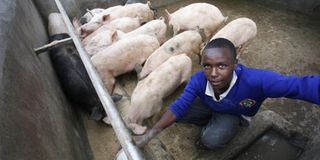Breaking News: Maai Mahiu tragedy: Death toll rises to 45
We feed ourselves and sell the surplus

Moses Karanja, a Form Two student at Rongai Boys High School in Nakuru County feeds pigs. PHOTO | SULEIMAN MBATIAH |
What you need to know:
- The whole idea of the project is ensure that the school and students are self-reliant.
- Nakuru County Director of Education Esther Muiru commends the farming initiative.
Ian Smith usually wakes up at 4.30am and goes for preps until 6am. He then takes his breakfast before joining other students in feeding animals in their pens.
His classes begin at 7.10am and run up to 3.30pm when the Form Two student goes back to the farm, a time he shares with sports and other co-curricular activities.
It is a routine which all students adhere to at Rongai Agri-Tech Boys High School, 30 kilometres west of Nakuru Town.
On a normal day when you visit the school after 3.30pm, you will spot a group of students breaking sweat at the institution’s five-acre piece of land.
The Catholic-affiliated institution with 380 students boasts of a model farm with 10 dairy cows, goats, dozens of chicken, hundreds of tilapia, more than 160 pigs, 100 rabbits, 15 sheep and seven turkeys.
The products from these animals are food to the students. The chicken lay on average 80 eggs daily which are used to bake cakes for the learners. The students also enjoy eggs and chicken twice a week.
“We normally don’t buy milk, meat, eggs or vegetables as we get them directly from our farm,” the principal, Brother James Thiong’o, told Seeds of Gold this week.
He says they get about 30 litres of milk daily from the two dairy cows that are currently lactating.
SCHOOL KITCHEN
“We sell surplus produce to the community. For instance, we sell an in-calf pig at Sh25,000 to those who want to rear the animal while most butchers buy any other pig at Sh18,000 during school vacation.”
Apart from the livestock, they also grow different types of crops to supplement their food. The students cultivate sukuma wiki (collard green), spinach, onions, tomatoes, green pepper and butternut, which find their way into the school kitchen.
Since it is situated in a semi-arid land, during the dry spell, the school gets water from a borehole. The water is used for irrigation.
The farming initiative, dubbed “Agricultural Education”, was started in 1994 by the Catholic priests who run the school to support bright needy students.
“The farm has enabled the school to subsidise fees because students are charged an average of Sh21,670 per term,” the 48 year-old principal says.
According to him, private schools in the same neighbourhood charge nearly double the amount. He adds that those who are unable to pay the fees in full can work on the farm during the holidays, where their fee balances are reduced by Sh700 per day.
The whole idea of the project is ensure that the school and students are self-reliant.
Bro Thiong’o points out that students who do not meet the university entry requirement have the option of venturing into agri-business because of the experience they get at school.
“At the same time, the school operations are not grounded due to over-reliance on charities or donors,” he explained.
But there must be someone to look after the farm when they break for holidays. A group of 20 boys remain behind for a week on a rotational basis.
SAUSAGE PRODUCTION
Students consume two pigs a week. The animals are slaughtered on Saturdays and inspected by health officers.
Once certified fit for human consumption, the pork is preserved in deep freezers.
Bro Thiong’o says the school has bought a machine and spices for sausage production and is in process of recruiting a competent person to be in charge of the venture.
“The number of pigs has increased from 70 to 161 since last year because of good management, hence the students will start enjoying a meal of sausages.”
The school rents a two-and-half acres adjacent to it, where maize and beans are grown.
The farm produces an average of 27 bags of maize a year, which is used to make ugali (maize meal), porridge and githeri (maize and beans mixture).
This is not sufficient because 10 bags are consumed on a weekly basis. So the school buys more maize with priority given to parents of needy students.
Despite students spending time on the farm, the private school records good performance with 73 out of 100 students attaining a grade of C+ and above last year. Its mean score was 8.70.
Nakuru County Director of Education Esther Muiru commends the farming initiative, noting that it is in line with Ministry of Education policy of sustainable development.
“We encourage such noble initiatives because they impart positive skills to students besides cutting costs in schools.”
She adds it is a good recreational activity since students are always pre-occupied, a situation which will helps them shun social vices.





